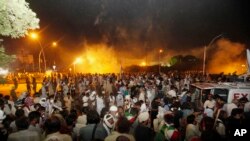More than 300 people have been reported injured in clashes between police and anti-government protesters in Islamabad.
The clashes broke out Saturday when thousands of protesters who have been camping outside parliament for two weeks demanding that Prime Minister Nawaz Sharif step down, tried to storm his home in the capital, using cranes to remove barricades.
Police responded with tear gas and rubber bullets.
The protesters are part of two separate mass rallies organized by cricketer-turned-politician Imran Khan and firebrand cleric Tahir-ul-Qadri. They have alleged massive fraud in the May 2013 election that saw Sharif sweep to power with a huge majority.
The prime minister rejects calls for his ouster as unconstitutional, and his attempts to find a negotiated end to the political crisis have not succeeded.
International observers have said the vote was largely free and fair.
The stalemate provoked rally leaders late Saturday to call for the demonstration to move toward the nearby official residence of the prime minister, who was away in his home city of Lahore at the time. Shortly after they began the march and started removing shipping containers used as barricades, police fired tear gas and rubber bullets.
The crackdown forced the protesters, some armed with clubs, to retreat, and hospital officials confirmed receiving scores of people, including police officers, with “minor and major wounds.”
Warnings issued
A ruling party lawmaker, Marvi Memon, says the government had been repeatedly and sternly warning protesters against crossing “mutually agreed red lines.”
“When the protesters tried to break the gate of the presidency, when the protesters tried to break the gates of Pakistan Secretariat, then of course action had to be taken and the writ of the state had to be established," she said. "Nowhere in the world is it allowed that protesters are allowed to enter government buildings.”
The trouble is taking place in an area that houses offices of the prime minister, president and other key government buildings. Foreign diplomatic missions are also located not far from where Saturday night’s clashes took place.
Calls for nationwide protests
Khan urged his supporters to extend the protest to the rest of Pakistan. The cricketer-turned-politician wants electoral reforms and new elections, alleging that massive rigging helped Sharif win last year’s parliamentary polls.
Qadri wants the prime minister out for similar reasons, but is demanding the installation of a so-called national unity government. The cleric also is seeking justice for the murder of 14 followers in a June police crackdown.
Some critics suspect the powerful army is behind the political unrest because it is unhappy with Sharif for putting the former military chief, Pervez Musharraf, on trial for high treason. Some say the move stems from Musharraf’s ouster of Sharif in the 1999 coup.
Since taking office about 14 months ago, Prime Minister Sharif has faced criticism for failing to deliver on campaign promises of reviving the national economy and addressing chronic power shortages.
His appointment of cronies and family members to key government positions is also cited as a key reason for the protests.
Some information for this report comes from AP, Reuters.
